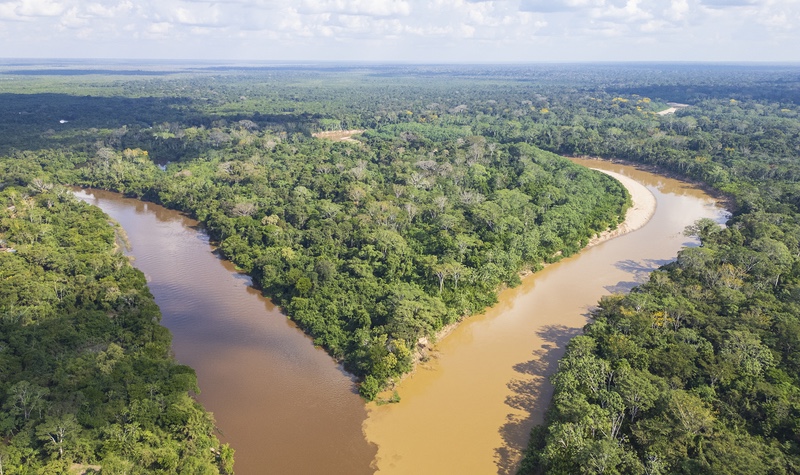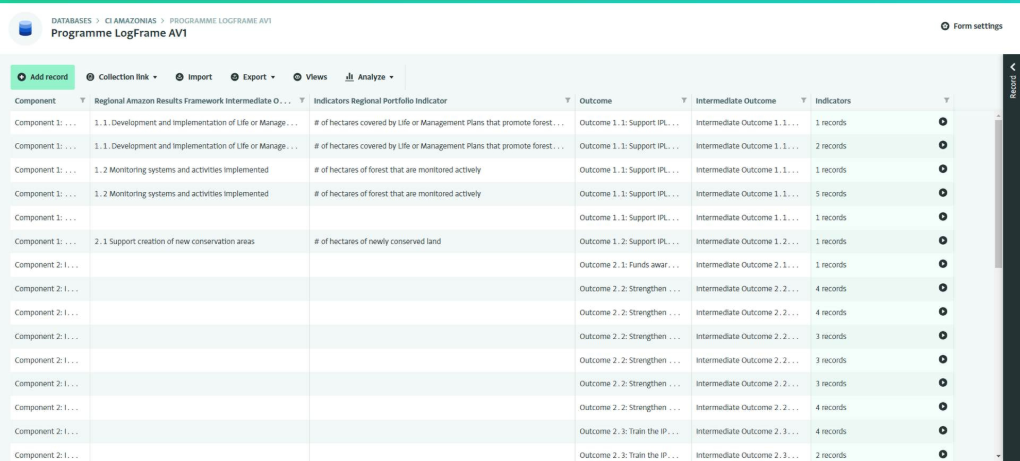Accountable data for climate mitigation with Conservation International - the “Our Future Forests - Amazonia Verde” Initiative

Conservation International (CI) has been dedicated to protecting the Earth’s climate, ecosystems, and biodiversity, recognizing their importance to the well-being of all people since 1987. Through a blend of fieldwork, scientific research, and innovative financial models, CI works globally to preserve vital ecosystems like oceans and forests, collaborating closely with Indigenous peoples and local communities, valuing their role as owners of their territories in the Amazon, and partner with governments to shape effective conservation policies long lasting for the future.
The organization has set feasible targets that focus on stabilizing the climate through nature preservation doubling ocean protection and promoting nature-positive economies for a sustainable future.
Amazonia Verde (AV) is a pioneering initiative built to support Indigenous Peoples and Local Communities (IPLCs) to conserve 12% of the Amazon rainforest by 2025, spanning seven countries: Bolivia, Brazil, Colombia, Ecuador, Guyana, Peru, and Suriname.
AV is a regional conservation program with a goal to conserve the Amazon, relying on close collaboration with Indigenous communities and local actors in the previous mentioned countries. Successfully, AV phase 1 secured and strengthened 25 million hectares of Indigenous and local community territories. Supported capacity building of over 2,700 Indigenous leaders in territorial management, conservation, and bioeconomy development.
Strengthened 22 value chains, promoting sustainable resource use by focusing on non-timber forest products, supporting local livelihoods while reviving ancestral practices. USD 863,245 allocated through 2 financial mechanisms. Over 100 grants and partnerships established with regional and national Indigenous organizations.
In this article, we explore how the teams working on Amazonia Verde approached the implementation of the program’s MEAL system with ActivityInfo.
Challenges in information management in climate mitigation
Data Integration and Measurement Challenges: While individual country indicators existed, there was no comprehensive system to consolidate this information or track macro-level progress effectively.
Developing Robust Measurement Frameworks: To address measurement challenges, the organization facilitated collaborative sessions with experts and stakeholders to identify management priorities and data needs. This inclusive process helped establish scientifically sound and culturally appropriate data collection methodologies.
Managing data across diverse countries: Monitoring the spill-over effects across such an extensive geographical area and in a setting where a variety of interventions are implemented by different stakeholders is another important challenge that needs to be addressed for a successful implementation. Different geographical areas and case-based data collection approaches add another dimension to this complexity. In the Amazonia Verde initiative, the geographical areas focused on indigenous territories.
Long-term data management for impact: Projects dealing with climate mitigation monitor long-term impact that often take decades to materialize. The MEAL system in these cases needs to account for that time-series data collection.
Reporting process: Amazonia Verde had to address challenges related to multi-donor data management across countries, while there was a need for a system that would integrate seamlessly with existing structures.
Results driven monitoring process: the implementation of a platform that helps to obtain data driven results is always a plus, offering a glimpse of implementation progress and adaptative management actions are important in a multi-country initiative.
ActivityInfo as a MEAL system for climate mitigation
ActivityInfo has been established as the preferred institutional MEAL information management system for Conservation International (CI) at the organizational level. Consequently, the Amazonia Verde project developed its MEAL system within ActivityInfo as a pilot, aimed at effectively capturing data across various levels to meet both country and regional data requirements while contributing to overarching institutional goals that are part of the Southern Cross Strategy of CI.

Each country participating in the Amazonia Verde initiative acted as a delivery actor producing outputs designed to achieve outcomes. These countries utilize individual logical frameworks, represented by distinct forms in ActivityInfo, which are tailored to meet their unique needs. This approach enables the project to effectively monitor outputs at the country level while maintaining the necessary detail and flexibility for local context.
To collect outcomes at the regional level, the organization collected and aggregated country data. Following the database setup, there was a standard process for indicator tracking:
- Country technical teams update indicator progress and support documentation.
- Country Managers validate data.
- Regional staff review data and propose changes.
- Country teams make adjustments.
- Regional staff uses revised data for reporting and monitoring.

In the platform, each stakeholder is assigned specific roles and permissions that reflect their
existing roles and responsibilities. Following the projects' indicators updates, ActivityInfo supported the organization with reports and the database available for a comprehensive overview of each Indicator.
Best practices for implementing a new MEAL system for climate mitigation
During the implementation of the new MEAL system, CI identified various best practices:
Involving key stakeholders at the design phase: The organization involved dedicated staff from the regional and country level in the process of developing the data model. The data model aimed to capture information (including relevant outputs and outcomes) about the implementation of the project at country level and then aggregate results from country to
regional level.
Change management principles: A solid change management plan can make a great difference when implementing a new information system. People working in the organization are about to change the way they collect, access and analyze data relevant to their work and they need sufficient time and resources to adjust to the change. Having a clear workflow and roles was key for the successful transition to the system; this included a defined timeline for data collection and the assignment of specific roles and permissions for data access and management. The organization established a regional and a global unit to help all countries make the transition and address any potential lack of capacity or resources within specific countries.
Pilot testing: The organization gathered a group of users to pilot the MEAL system before launching it more widely. This helped them gather feedback and provided the insights needed to develop a manual with step-by-step instructions on how to use the new information system.
Launching with a demo and ongoing support: When the organization launched the MEAL system, Actitiv Info offered a demo session where they showcased how the platform would be used. They also offered ongoing support to country teams.
Feedback and system evaluation: After the first six months of use of the MEAL system, the organization and the ActivityInfo Customer Success team worked together to collect feedback from the countries using it to evaluate and identify areas of opportunity.
Supporting adoptions with ongoing local capacity building: During the adoption phase, the organization followed an interactive approach and offered local capacity building to country teams to ensure not only the continuous improvement of the process and the system, but also ongoing learning.
Participatory processes across all levels: In the meantime, the organization reinforced participatory processes across all levels to promote ownership of the system and to foster adaptive management and the effective use of data, not only for the AV project but also for other projects monitoring within the organization.
Conclusion
All in all, because each MEAL system design has specific ideocracies linked to each particular implementation, it is not possible to address the challenges that arise with a generic solution.
Nevertheless, having a platform/system that helps you to move to a data driven MEAL approach and offers you to innovate the traditional MyE approach helps to improve how you follow up and present your progress/results, for a decision-making process.
For the Amazonia Verde initiative, the adoption of an integrated system, such as ActivityInfo, led to enhanced data accessibility, spanning from local to global level. By seamlessly integrating information from local to national and regional levels the organization maintains alignment with the Amazon Strategic Planning and the global organization goals. It also becomes possible and much easier to highlight how diverse projects impact specific themes and geographic areas and identify gaps or the impact of a unified effort.
The ActivityInfo team would like to thank Andres Ramirez, Communications Senior Manager Programa Amazonia, Andrea Defaz, Monitoring, Evaluation and Reporting Senior Manager Amazonia Program, Fernanda Gonzalez, Amazonia Portfolio Director, and Natalia Garcia, Senior Manager, Restoration Delivery M&E, Center for Natural Climate Solutions, Global Restoration Program for their valuable insights in this Case Study.